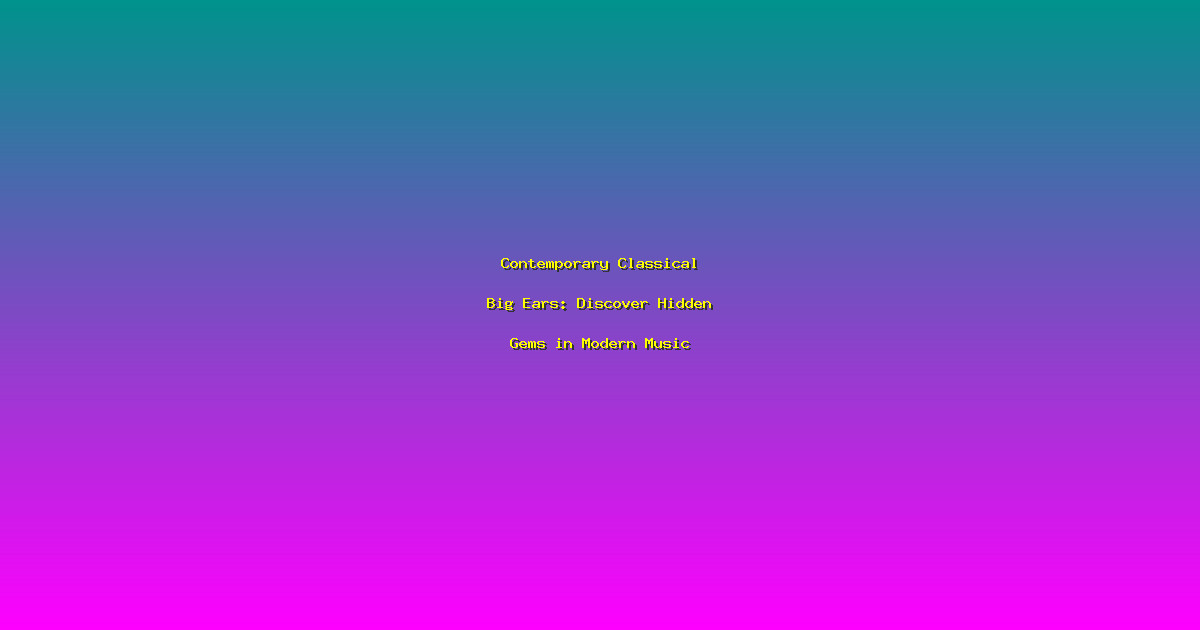Contemporary Classical Big Ears: Discover Hidden Gems in Modern Music
Have you ever felt like there’s more to music than just the top 40 hits? If you’re looking to expand your musical horizons, you might want to explore the world of Contemporary Classical Big Ears. This genre is a treasure trove of innovative sounds and compositions that challenge traditional boundaries. Whether you’re a seasoned listener or a curious newcomer, this article will guide you through the fascinating world of contemporary classical music, helping you discover hidden gems and enrich your listening experience.
Understanding Contemporary Classical Big Ears
Contemporary classical music, often referred to as Contemporary Classical Big Ears, is a genre that pushes the boundaries of traditional classical music. It incorporates elements from various musical styles, including electronic music, jazz, and world music. This genre is characterized by its experimental nature, often featuring unconventional instruments, complex rhythms, and innovative soundscapes.
- Experimental Nature: Contemporary classical music often breaks away from the traditional structures and forms of classical music. Composers in this genre frequently experiment with new sounds and techniques, creating unique and often surprising compositions.
- Unconventional Instruments: One of the hallmarks of contemporary classical music is the use of unconventional instruments. From prepared pianos to electronic synthesizers, these instruments add a fresh and innovative dimension to the music.
- Expert Insight: “Contemporary classical music is all about pushing the envelope and challenging the listener’s expectations,” says Dr. Emily Thompson, a renowned musicologist. “It’s a genre that constantly evolves and adapts, making it incredibly exciting and dynamic.”
Exploring the Diversity of Contemporary Classical Big Ears
One of the most fascinating aspects of contemporary classical music is its incredible diversity. From minimalist compositions to avant-garde soundscapes, there’s something for every listener. Let’s dive into some of the key subgenres and styles within this genre.
- Minimalist Compositions: Minimalist music, a subgenre of contemporary classical, focuses on simplicity and repetition. Composers like Philip Glass and Steve Reich have made significant contributions to this style, creating hypnotic and meditative pieces that are both soothing and thought-provoking.
- Avant-Garde Soundscapes: Avant-garde contemporary classical music often pushes the boundaries of what is considered “music.” Composers in this subgenre frequently incorporate unconventional sounds and techniques, creating immersive and often challenging listening experiences.
- Actionable Advice: To fully appreciate the diversity of contemporary classical music, it’s essential to explore a wide range of composers and styles. Start by listening to a few key works from each subgenre and gradually expand your repertoire.
How to Appreciate Contemporary Classical Big Ears
Appreciating contemporary classical music can be a rewarding experience, but it often requires a different approach than listening to more traditional genres. Here are some tips to help you get the most out of your listening experience.
- Case Study: Consider the work of composer John Adams, whose piece “Short Ride in a Fast Machine” is a prime example of contemporary classical music. This piece, with its driving rhythms and innovative use of orchestral instruments, showcases the genre’s ability to captivate and engage listeners.
- Expert Quote: “To truly appreciate contemporary classical music, it’s important to approach it with an open mind and a willingness to explore new sounds and ideas,” advises Dr. Thompson. “Don’t be afraid to experiment and find what resonates with you.”
- Implementation Steps: Start by attending a live performance or listening to a curated playlist. Engage with the music actively by reading about the composer and the context in which the piece was created. This can provide valuable insights and enhance your appreciation of the music.
Frequently Asked Questions
What makes contemporary classical music different from traditional classical music?
Contemporary classical music differs from traditional classical music in its approach to composition and performance. It often incorporates new technologies, unconventional instruments, and experimental techniques, creating a more diverse and innovative sound.
How can I find contemporary classical music to listen to?
There are several ways to discover contemporary classical music. Streaming platforms like Spotify and Apple Music have dedicated playlists and channels. Additionally, attending concerts and festivals can provide a firsthand experience of this genre.
Are there any notable contemporary classical composers I should check out?
Yes, there are many notable contemporary classical composers worth exploring. Some of the most influential include John Adams, Philip Glass, and Steve Reich. Each of these composers has made significant contributions to the genre and offers a unique perspective on contemporary classical music.
Is contemporary classical music difficult to understand?
While contemporary classical music can be complex and challenging, it’s not necessarily difficult to understand. Like any genre, it requires an open mind and a willingness to explore new sounds and ideas. With time and practice, you’ll develop a deeper appreciation for the nuances and subtleties of this genre.
How can I incorporate contemporary classical music into my daily life?
Incorporating contemporary classical music into your daily life can be as simple as adding it to your playlist or listening to it during your commute. You can also attend concerts and engage with the community of contemporary classical music enthusiasts to deepen your understanding and appreciation of the genre.
Conclusion
Exploring the world of Contemporary Classical Big Ears can be a transformative experience. By embracing the diversity and innovation of this genre, you’ll discover hidden gems and enrich your musical journey. Whether you’re a seasoned listener or a curious newcomer, contemporary classical music offers a wealth of opportunities for discovery and enjoyment. So, take the first step today and dive into the captivating world of contemporary classical music.
